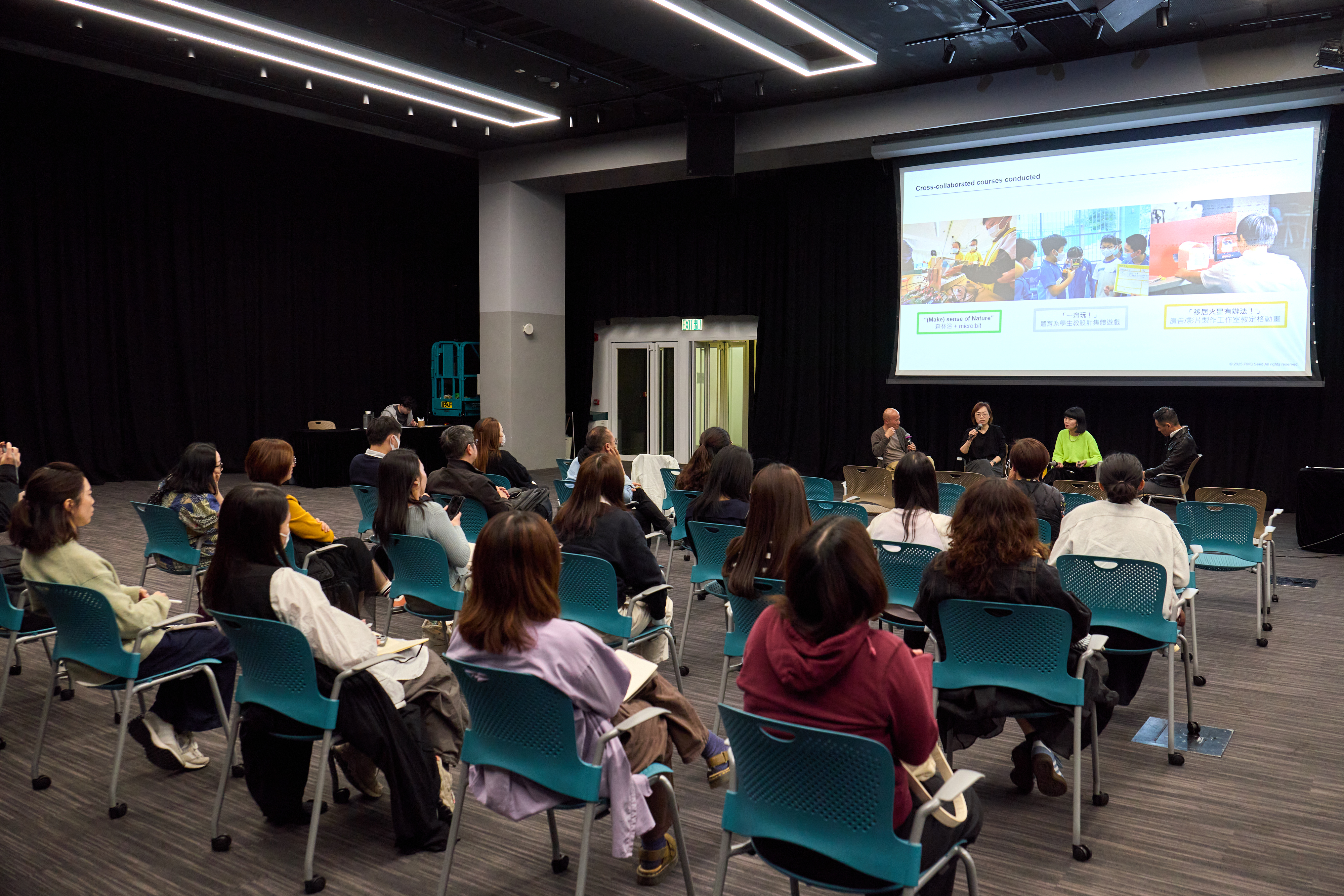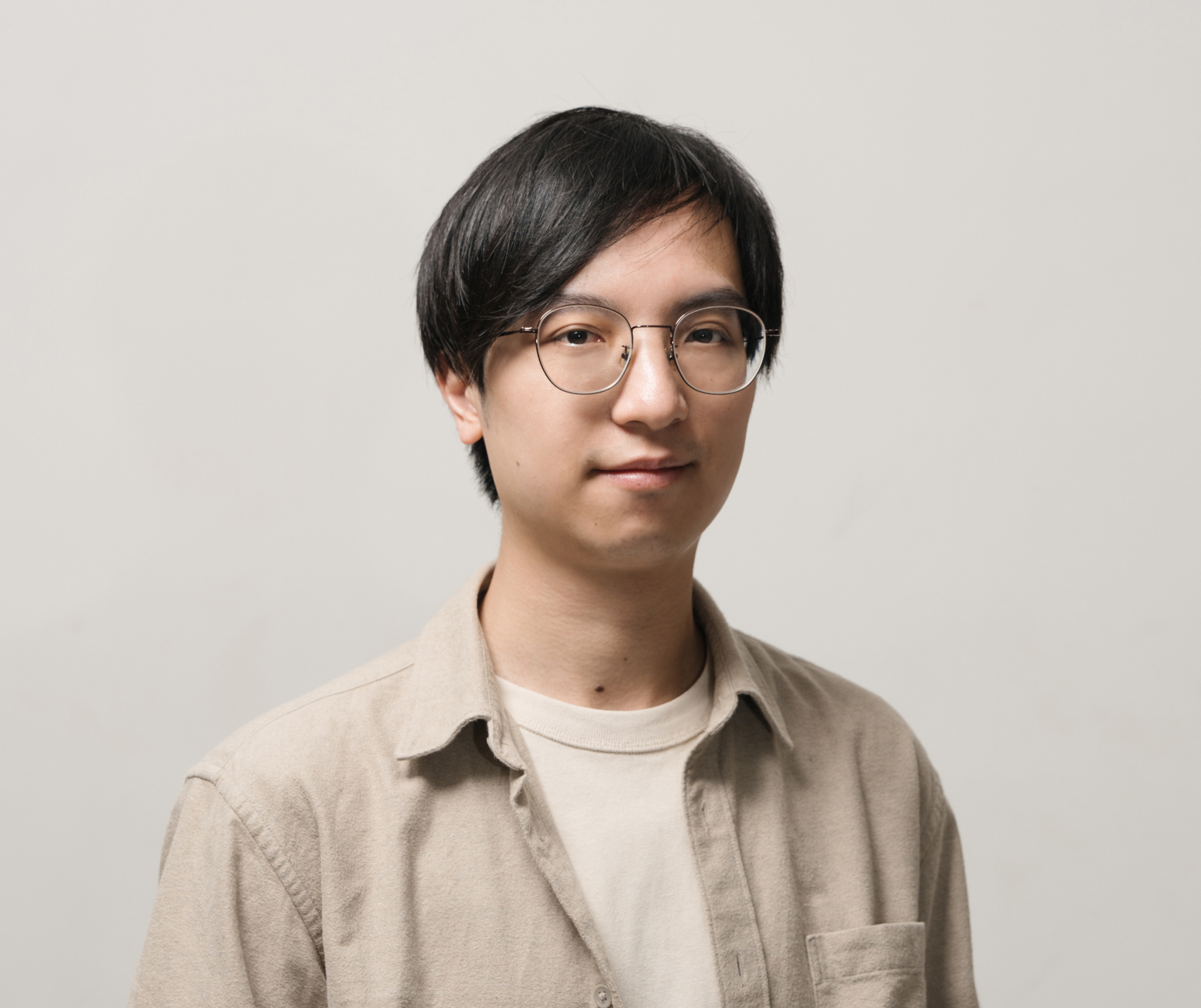
From March to May 2025, PMQ Seed partnered with the Design Thinking Team from the Hong Kong Design Institute (HKDI), architect, artist, designer, teacher from school and social workers who are professionals equipped with ample teaching experience, to host a series of Train the Trainer Workshops. The target audience of the workshops are mainly cross-disciplinary creative professionals participating in PMQ Seed creative education programmes this year, local school teachers and creative professionals who are interested in creative education. The workshops provided knowledge on applying design thinking in cross-disciplinary sectors, handling children’s emotional and behavioral needs and students with Special Educational Needs, participants were encouraged to apply the knowledge into their programmes and lessons. The HKDI team will also continue to offer professional advice for programmes of PMQ Seed throughout the year.
The sharing session (primary school) of the PMQ Seed Train the Trainer workshop series: "Creativity in Action - Case studies of children’s self-initiation taught by cross-collaborated creative professionals" took place in March. We were delighted to have lecturer Mr. Edwin Wong from the Hong Kong Design Institute (Edwin), school teacher of Pentecostal Gin Mao Sheng Primary School Ms. Chan Ka Ngai (Ms. Chan); the representative of the curatorial team of PMQ Seed 2024 Creative Summer Festival, product designer, visiting lecturer at the School of Design of the Hong Kong Polytechnic University, founder of Milk Design Limited Mr. Chi-wing Lee (Wing), Knot and craft designer Ms. Zoe Siu (Zoe), who shared with us their previous experience of children's self-initiation practices facilitated by cross-collaborated creative professionals and discussed methods to enhance the personal growth of primary students in design thinking training.
Edwin first began with the basic introduction of design thinking and demonstrated the importance of practicing design thinking in primary school. Highlighting the focus on the self-initiation of children in the PMQ Seed Creative Summer Festival, Wing then shared his experience last year inviting cross-disciplinary creative professionals to serve as design tutors, empowering children to take initiative. One of the design mentor representatives, Zoe, believed that her expertise in knotting and weaving could offer children a new perspective on plastic reduction, the theme of plastic waste problem and weaving, promoting children’s creativity and imagination. Zoe mentioned, “Our top priority in teaching is to not reject students’ ideas but to embrace their process of generating new opinions in their creative journey.”
Pentecostal Gin Mao Sheng Primary School was one of the schools that joined Zoe’s lessons. Ms. Chan recalled how her students designed a mini performance of doing a catwalk by themselves, showcasing their upcycled plastic bags by using the knotting technique. She pointed out that there are few chances for their school to join similar activities for students to create or initiate something on their own. However, after the showcase at the Creative Summer Festival and Learning and Teaching Expo, she observed that students were more willing to express themselves. “They communicated with others more confidently, demonstrating the positive effects on the all-round development of students through self-initiation.”, raised by Ms. Chan.
Followed by then, Wing elaborated on some previous experiences of applying cross-collaborated elements to the Creative Training Class designed for primary school students. Depending on the theme each year, Wing and his team collaborated with various creative partners, including advertisement/video-making studios or Forest Bathing guide, to form a diversified cross-collaborated professional teaching team and design courses based on the design thinking process, bringing fun and educational experiences to students while promoting design thinking process to different aspects of life.
Through the sharing of past experience and practice, teachers and experts in the creative industries who are interested in creative education can learn more about design thinking and solving problems in creative ways through a people-centered perspective. We would like to express our sincere gratitude to presenters and every participant for your participation.
PMQ Seed has expanded the prorgamme to junior secondary students since last year. Last Friday, we conducted a sharing session “Sharing (Secondary School): Enhancing the teaching effectiveness of STEAM education – Case study of design thinking courses”. We were honored to have lecturer Edwin Wong from the Hong Kong Design Institute, Mathematics teacher of Ho Dao College (Sponsored by Sik Sik Yuen) Mr. Tsang Siu Fung, as well as teaching team representative of the Creative Training Class (Junior Secondary): co-founder of AaaM Architects and architect Mr. Kevin Siu, with us to discuss how design thinking training could help nurture the problem-solving mindset of secondary school students and promotes the teaching effectiveness of STEAM at school.
Edwin first introduced the concepts of design thinking and indicated the importance of practicing design thinking at secondary schools, pointing out the complementary possibility between STEAM development at secondary schools and design thinking practice. Ho Dao College was one of the participating schools last year, Mr. Tsang mentioned that the school has been proactively developing STEAM education and hardware on STEAM development are sufficient and solid, while the school lacks the training of soft skills and design thinking.
Kevin shared that, the Creative Training Class conducted by AaaM Architects last year started with empathy, guiding students to discover the pain point in the plastic pollution problem. The course included interviews in the community which encouraged students to experience and analyze data, in order to trace the root problem by themselves. Students then designed people-centered solutions from the user’s perspective, fostering interdisciplinary studies and team spirit. Kevin and his team carrying out the five stages of the design thinking process in simple terms supported the lack in soft skills training and enhanced the development of problem-solving skills, unleashing students’ potential in STEAM. From Mr. Tsang’s observation, “students were more engaged, punctual, and expressive in the course, gaining a lot from the problem-solving process.”
Through the sharing of past experience and practice, teachers, experts in the creative industries who are interested in creative education, hopefully understand more about design thinking and its application in secondary schools. We would like to express our sincere gratitude to presenters and every participant for your participation.
This year, PMQ Seed continued its partnership with the HKDI and the workshops were led by HKDI lecturer Edwin Wong. This year’s workshops incorporated various real-life application and examples of design thinking in order to provide participants with a better understanding of the concept. On the first day, Edwin introduced key tools and concepts of design thinking, such as convergent and divergent thinking and the user journey map, he also shared how one of the participating schools applied these concepts to life education. This sharing hopefully inspired the school teachers to explore how design thinking can be applied in their own schools.
In the Advanced Workshop, Edwin explained the concept of frame innovation, outcome-based learning and the importance of assessment and evaluation. He also invited product designer Jeff Wan to share with us how he went through the changes of shoe-making industry over time and the way he utilized different technology to design products for customers with people-centred approach. Last but not least, this year we also arranged a session for our teaching teams to share their initial teaching plan with the school teachers. This provided an opportunity for school teachers to offer feedback and suggestions for further improvement.

Hong Kong Design Institute - Design Thinking Team
The Hong Kong Design Institute’s Design Thinking Team was founded in 2017, and is focused on developing design thinking partnership and training programmes. The team consists of higher education professionals with extensive experience in the field of design, who are passionate about facilitating the education and application of design thinking in tertiary, secondary, and primary schools, as well as the design industry.
The theme of PMQ Seed this year is centred around the seven senses, encouraging children and teens to observe and perceive the world through different senses and inspiring them to create in response to their changing surroundings. For the first Train the Trainer session aligned with this year’s theme, we invited the occupational therapy team from SAHK to deliver workshops that combined theory, knowledge, and hands-on practice. The goal was to provide teaching teams with a comprehensive understanding of sensory integration and executive function, and how these relate to design thinking and creativity.
During the sharing sessions, SAHK’s Senior Occupational Therapist, Cherie Tam, discussed the process of sensory integration, explaining the situations involving hypersensitive or hyposensitive reactions. She provided related solutions to help the teaching teams apply these concepts in their classes. Additionally, Cherie highlighted the commonalities between sensory integration, executive function, and design thinking, noting that all three theories share a foundation in ideation, planning, and execution.
Beyond the theoretical aspect, the teaching team visited the therapy centre at SAHK to try out different equipment and gain a better understanding of their own sensory spectrums. Ultimately, they designed an experience suitable for individuals across various spectrums, learning how to adjust the difficulty levels in their classes to meet the diverse needs of their students. Cherie emphasized that everyone has a unique sensory spectrum, it is important to understand and empathize with their needs.

Founded in 1963, in upholding its belief in “Succeed and Advance”, SAHK is dedicated to provide a wide range of education and rehabilitation services for persons with disabilities at all ages. The Association’s four core services are “Children and Family Support Service”, “Special Education”, “Adult Service” and “Community Support Service”. At present, under the auspice of the Association, a total of 84 service units and Specialised Programmes currently provide services to around 29,000 families per annum.
In order to equip the teaching teams with skills in applying different senses to teaching, PMQ Seed hosted training workshops which focused on body movement. The workshop allowed participants to experience how to sense themselves and explore their surroundings through sensory perception.
The body movement workshop was led by Rice Journey Studio, an organization that promotes movement education. The workshop provided several exercises for the teaching teams to explore diverse possibilities of body movement, including improvisation, the relationship between objects and space, the correspondence between movement and music, and movement analysis.

Rice Journey Studio
Rice Journey Studio was established in 2015, dedicated to promoting rhythmic arts education with the philosophy that "movement is a way of learning." Through creative body movement, we learn to observe and discover in our daily lives, expressing our reflections on life through various art forms.
Soundpocket, an organization that promotes sound art and listening culture, with the sound artist Larry Shuen were invited to host the sound collecting workshop. The teaching experienced the intersection of sound and body movement through different exercises and learned about field recording and sound mapping as methods of sound collection. These activities encouraged participants to make better use of hearing to observe their surroundings and spark creative inspiration.


soundpocket
soundpocket is a registered charity founded in 2008. It promotes the art of sound and listening and its research and education in Hong Kong. The Library by soundpocket is a website of sounds that tell stories about Hong Kong culture and society. It aims at creating a community of active listeners who are curious about listening as a way of knowing ourselves and each other. It also aims at contributing to our public culture of listening.
The Library by soundpocket: https://www.thelibrarybysoundpocket.org.hk/
Larry SHUEN
Composer, sound artist, and media artist Larry Shuen draws deep inspiration from classical music and his extensive training in musical composition. His works often orignates from a profound engagement with the act of listening itself, through which Shuen articulates his reflective thoughts on life and his surroundings. Shuen's recent works include It’s not in the music, but it’s in the music, or not. a lecture performance that addresses performability in music; and a series of visual works that focused on musicians’ gestures which he further developed in his solo exhibition What Movements Can Tell. Shuen is also active in theatre production as a sound and media designer, as well as in arts initiatives and university teaching as an teaching artist.
Teaching teams sometimes encounter behavioural and emotional problems among students at classes, in order facilitate classroom management, PMQ Seed invited registered Educational Psychologist Michelle Li to deliver a sharing session to share tactics with the teaching teams.
Michelle began with explaining the reasons behind the occurrence of students’ behavioural or emotional problems, including physiological factors or acquired traits, so that the teaching teams were able to understand and learn to observe students with different characteristics in the spectrum.
The sharing session also included group discussion and role-play for the teaching teams so as to experience and simulate how to properly intervene, handle and adjust when they encounter sudden occurrence in classroom setting.

Michelle W.Y. Li, AFHKPS, CPsychol.
Michelle is a dedicated educational and child psychologist in private practice with over a decade of experience. She is recognized as a Registered Educational Psychologist and an Associate Fellow, and serves as the PR Secretary and Council Member of the Hong Kong Psychological Society (HKPS). She also acts as the Director and Honorary Advisor of the Hong Kong Society of Psychological Innovation. Michelle holds a BA (Hons) in Natural Sciences from the University of Cambridge, as well as an MSocSc in Educational Psychology and a PGDE from the University of Hong Kong, where she is currently pursuing her Ph.D. Michelle has extensive experience in supporting students from diverse cultural backgrounds and with various challenges. She firmly believes in the power of collaboration between parents and educators to empower children and adolescents to achieve their full potential.

